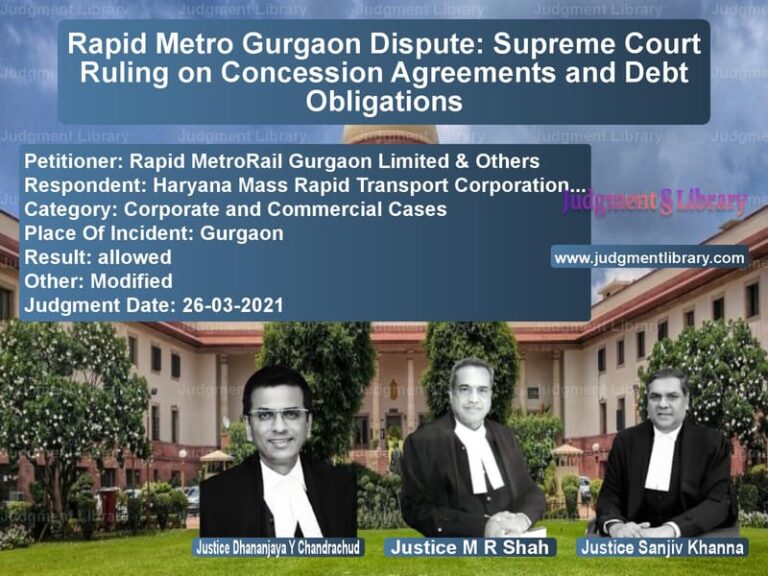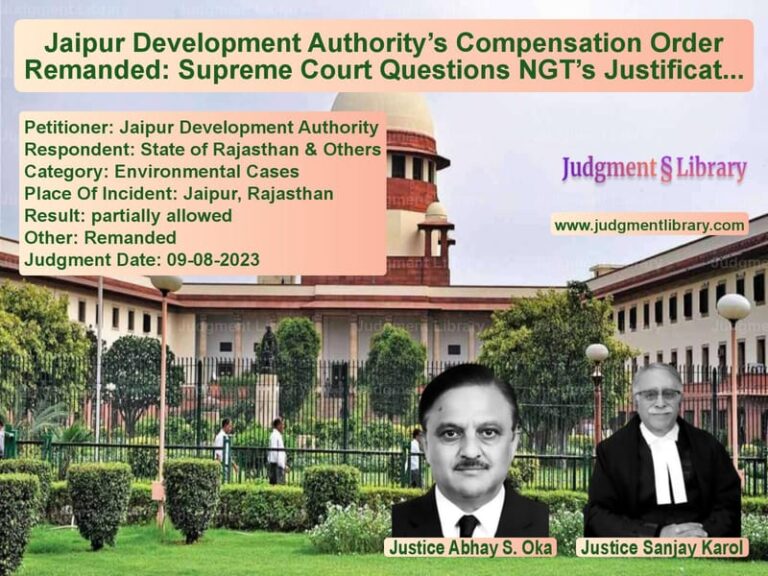Supreme Court Acquits Forest Officer in Murder Case Citing Right to Private Defence
The case of Sukumaran vs. State Represented by the Inspector of Police is a significant judgment concerning a government officer’s right to private defence while discharging official duties. The Supreme Court overturned the conviction of the appellant, who was a Forest Range Officer, ruling that he had acted in self-defence while on duty.
Background of the Case
The appellant, Sukumaran, was a Forest Range Officer posted in the Dharmapuri forest area, Tamil Nadu. On June 5, 1988, while patrolling the forest with his driver, he encountered a lorry carrying individuals suspected of illegal sandalwood smuggling. When he attempted to stop them, they allegedly threw stones at him and his driver, shouting threats. In response, he fired a gunshot, which fatally struck Basha, the driver of the lorry.
Following the incident, the appellant reported the event to the police, asserting that he had fired in self-defence. However, he was later charged with murder under Section 302 IPC, along with other offences under the Tamil Nadu Forest Act and the Arms Act.
Trial Court and High Court Decisions
The Additional Sessions Judge convicted Sukumaran under:
- Section 302 IPC (Murder) – Life imprisonment.
- Section 203 IPC (Giving false information to protect an offender) – Two years of rigorous imprisonment.
- Section 36-A and E of the Tamil Nadu Forest Act – Two years of rigorous imprisonment.
- Section 3 read with Section 25(1-B)(a) of the Arms Act – Two years of rigorous imprisonment.
However, on appeal, the Madras High Court modified the conviction:
- Conviction under Section 302 IPC was altered to Section 304 Part II IPC (Culpable homicide not amounting to murder) – Five years of rigorous imprisonment.
- The appellant was acquitted of all other charges.
Dissatisfied, Sukumaran approached the Supreme Court, arguing that he had acted in self-defence and that his conviction was unjustified.
Legal Issues Before the Supreme Court
The key legal questions in the case were:
- Whether the appellant was justified in exercising his right to private defence.
- Whether his actions fell under the provisions of Sections 96 to 106 IPC, which define self-defence.
- Whether the prosecution had proven its case beyond a reasonable doubt.
Arguments by the Petitioner (Sukumaran)
- The appellant argued that as a Forest Range Officer, he had the legal duty to prevent illegal activities, including sandalwood smuggling.
- He contended that the deceased and his associates attempted to attack him with stones and were armed, prompting him to fire in self-defence.
- The FIR lodged immediately after the incident clearly mentioned the self-defence claim, showing no intention to fabricate the case.
- He pointed out inconsistencies in the prosecution’s version of events and the fact that key prosecution witnesses had turned hostile.
Arguments by the Respondent (State Represented by the Inspector of Police)
- The prosecution maintained that the appellant had exceeded the limits of self-defence.
- They argued that the bullet hit the deceased in the back, indicating that the use of force was not proportionate.
- Their case rested on the assumption that the appellant could have used other means to control the situation rather than firing directly at the deceased.
Supreme Court’s Analysis and Judgment
The Supreme Court carefully analyzed the appellant’s right to private defence under Sections 96 to 106 IPC. The Court observed:
- “A person has the right to defend his body or another person’s body against an offense affecting the human body.”
- “It is not necessary that an actual attack should happen; a reasonable apprehension of danger is enough to invoke self-defence.”
- “The deceased’s group was aggressive, armed, and outnumbered the appellant and his driver. The appellant had a duty to protect himself and his associate.”
- “The appellant’s actions were in response to a threat. Given the surrounding circumstances, he was justified in using force.”
The Court concluded that the appellant had acted within the legal framework of self-defence and was wrongly convicted by the lower courts.
Final Judgment
The Supreme Court ruled:
- The conviction under Section 304 Part II IPC was set aside, and the appellant was acquitted of all charges.
- The prosecution had failed to prove beyond reasonable doubt that the appellant had acted with criminal intent.
- The appellant’s self-defence claim was accepted based on the circumstances of the case.
Significance of the Judgment
This ruling reinforces several key legal principles:
- Government officers have the right to defend themselves while performing official duties.
- The burden of proof in criminal cases remains on the prosecution. If key witnesses turn hostile, the prosecution must still establish guilt beyond reasonable doubt.
- Self-defence is a legally protected right, and courts must consider the immediate circumstances before concluding that an accused exceeded the right.
Conclusion
The Supreme Court’s decision in Sukumaran vs. State Represented by the Inspector of Police serves as an important precedent in cases involving law enforcement and self-defence. It ensures that officers discharging their duties are not wrongfully convicted when acting to protect themselves and maintain law and order.
Petitioner Name: Sukumaran.Respondent Name: State Represented by the Inspector of Police.Judgment By: Justice Abhay Manohar Sapre, Justice R. Subhash Reddy.Place Of Incident: Dharmapuri, Tamil Nadu.Judgment Date: 07-03-2019.
Don’t miss out on the full details! Download the complete judgment in PDF format below and gain valuable insights instantly!
Download Judgment: Sukumaran vs State Represented by Supreme Court of India Judgment Dated 07-03-2019.pdf
Direct Downlaod Judgment: Direct downlaod this Judgment
See all petitions in Attempt to Murder Cases
See all petitions in Custodial Deaths and Police Misconduct
See all petitions in Fraud and Forgery
See all petitions in Judgment by Abhay Manohar Sapre
See all petitions in Judgment by R. Subhash Reddy
See all petitions in allowed
See all petitions in supreme court of India judgments March 2019
See all petitions in 2019 judgments
See all posts in Criminal Cases Category
See all allowed petitions in Criminal Cases Category
See all Dismissed petitions in Criminal Cases Category
See all partially allowed petitions in Criminal Cases Category







